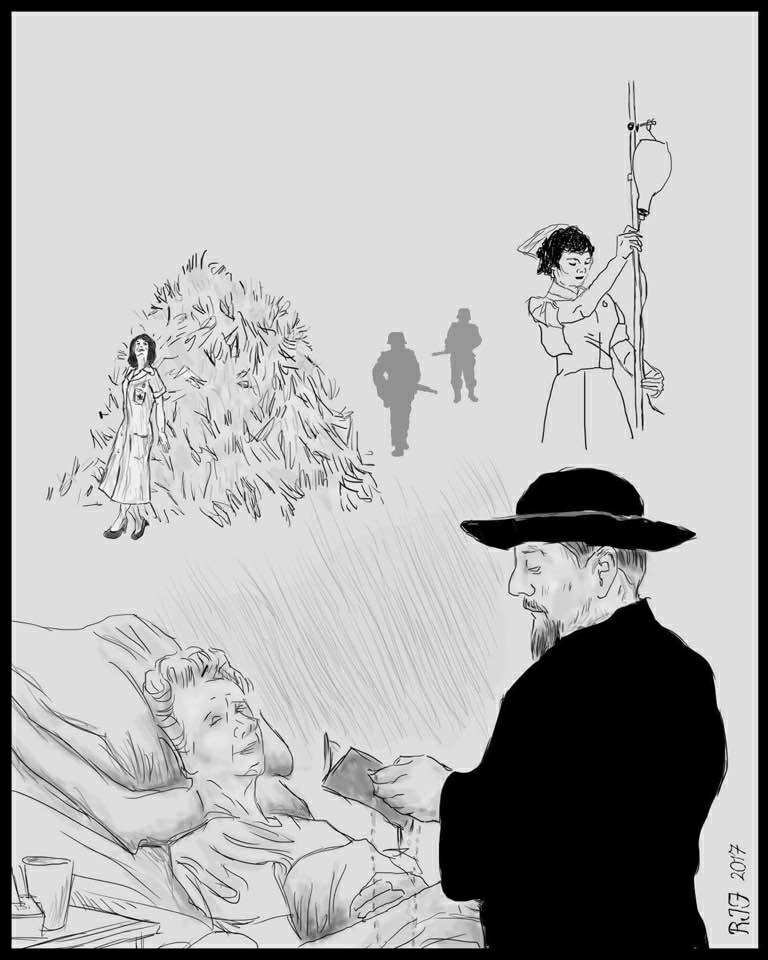
John Henry Newman’s motto sums up my philosophy of ministry in just a few words: Cor ad cor loquitur (Heart speaks to heart). I functioned as a conduit in which His heart spoke through mine to others. It is a form of self-denial in a way. There was no room for ego in this ministry but a crucifixion of self.
Chaplaincy is a unique ministry in not only its context but in it’s calling. As a chaplain for 12 years in a retirement community and one who ministered exclusively to those in pain, suffering and dying, it became very clear to me that not all ministers are called to this ministry full-time.
However, it likewise became clear to me that you could not minister effectively unless you allowed yourself to “feel” a measure of the hurt and pain of those you were ministering to. You had to enter their world in order to understand their world of pain and sorrow.
You see, I didn’t “do” visitations, I “experienced” them.
For example, after being a physics teacher at New York University for 30 years, I now have to reconcile with the insidious disease of Parkinson’s. A lifetime couched in problem solving and analytical thinking as a scientist seems to be overcome by a cloud of darkness when confronted by ones own mortality.
I have experienced the intensity of a French nurse crawling through farm fields at night behind enemy lines in occupied France hiding in haystacks during the day just trying to make it to the allied lines without being captured.
I have felt escaping the Nazis only to come to America with no money and no prospects, but eventually going on to earn two degrees and teaching American women becoming nurses the value of human life and the care of the suffering.
Now, 50 years later with no family and friends left to visit, the long lonely nights are eerily similar to the ones in occupied Europe, only this time without and prospect of hope, the thought of which presents a creeping despair, as the cancer in the stomach continues to consume the treasured past, present and future.
All of which causes one to wonder – what awaits me after this?
Again, I have felt the excitement of a Princeton graduate enlisting in the Air Force to serve his country only to be shot down over Nuremburg, Germany, and taken to a prison camp hospital where night and day for two weeks he heard the screams of gypsies in railroad boxcars outside the prison windows until, day after day, they became quieter and quieter in the summer heat as they died in their compact hell.
Now, every night in his sleep he can hear those cries as if they were yesterday, mixing with his own, while the tumor in his brain continues to grow and he thinks – Where is God in all this?
I have experienced the confusion of a helicopter door gunner in Vietnam who still doesn’t understand the war that changed his whole world, much less the stroke that paralyzed his left side two days after his 60th birthday and the lung cancer they found in him at the same time. Confused and watching his life slip away from his grasp, he poses the question, “Father, if I ask God politely for a few more years, do you think He will give it to me?”
When it comes to those suffering, pastoral care must guide, nudge, and move people in the right direction so they can use their suffering, so they can make something out of it for their eternity.
Essentially, I am a midwife because just as giving birth is hard and painful, so is dying.
We, as Chaplains, must help people to use their mortality for their immortality, to help them suffer well. I have found that in order for a minister/chaplain to be effective in this, they must first look to themselves.
Holiness is essential to this task because a priest will never bring anyone closer to Jesus than he is.
The object of the Cross; the Passion of Christ, is where a priest must self-identify so he can bring those dying to see the fellowship they have in Christ’s suffering.
Only in the light of the Passion does suffering and death have meaning and this is where we, as priests, must bring those who are scared, confused, and are going through the birth pangs of dying to live.
The Cross – is the central place where all three – Christ, the sufferer and the priest meet. Again, you don’t go into the ministry unless the ministry is in you first. Only because of this reality is the reason we don’t do visitations, we experience them.
Because in order to tell someone his or her suffering has meaning necessitates you experiencing it with him or her albeit in a different way.
A pre-planned script or a guarded heart so as to not feel pain during a visitation in not only not being real, but is also a hindrance to Christ’s working through you. If the Christian life is to participate in Christ, how much more is being a priest, and in my context, a chaplain, ministering to the dying, grieving and suffering?
Originally published on Oct. 23, 2016 on nj.com
Sketch by Roland J. Ford, 2017



Leave a Reply